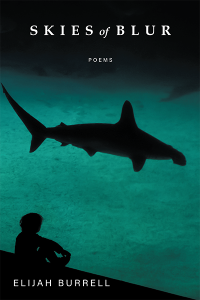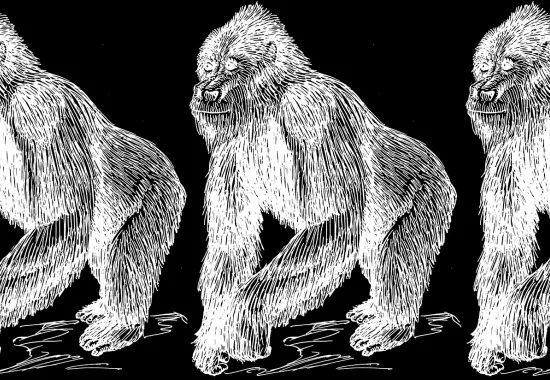Review: Skies of Blur by Elijah Burrell
Midlife is often hailed as “the prime of our lives.” It’s a phrase that conjures a handsome profile: That of a fully-formed human adult at the height of their capabilities. But the experience of midlife is more crossing than peak. It is a murky boundary between youth and age. In his third collection of poems, Skies of Blur, Elijah Burrell troubles that boundary. He explores the tender terrors of fatherhood, plumbs the depths of grief over parental loss, wonders and worries over a changing world, and finds refuge in love and friendship. The result is a moving assemblage that evokes midlife’s unique anxieties and challenges while employing deadpan humor and a superior musical score.
 The idea that all adults are faking it to make it is so ubiquitous now that it’s become a meme. In the book’s first poem, “Prelude / Headspace,” Burrell situates his readers by invoking one of the oldest memes on earth: Peter walking on water toward Jesus and slipping under the surface when he fears the wind. “In Simon Peter’s native tongue, / I wonder if boat and doubt sound slant,” the speaker muses, “When he sank, did he see the wink in Christ’s / eyes?” The joke that Christ is in on, Burrell seems to imply, is that no one knows what they’re doing or how they’re doing it. The image of “spinning plates” returns repeatedly in this collection—a metaphor all too familiar to the overburdened American families of today. But like Peter, the speaker in these poems draws on faith to move forward and through the slippery terrain ahead.
The idea that all adults are faking it to make it is so ubiquitous now that it’s become a meme. In the book’s first poem, “Prelude / Headspace,” Burrell situates his readers by invoking one of the oldest memes on earth: Peter walking on water toward Jesus and slipping under the surface when he fears the wind. “In Simon Peter’s native tongue, / I wonder if boat and doubt sound slant,” the speaker muses, “When he sank, did he see the wink in Christ’s / eyes?” The joke that Christ is in on, Burrell seems to imply, is that no one knows what they’re doing or how they’re doing it. The image of “spinning plates” returns repeatedly in this collection—a metaphor all too familiar to the overburdened American families of today. But like Peter, the speaker in these poems draws on faith to move forward and through the slippery terrain ahead.
Coming into midlife has always brought on existential crises in varying shades of cliché, but coming into midlife at this particular juncture in American life calls for a reckoning that can’t be resolved with a sports car. The collection’s second section begins with a poem (“The Sharknapper”) about the real-life theft of a shark from the San Antonio Aquarium. At first, the speaker is the thief:
I need blunt fish touch. I need rigid slick wet.
I need a horn shark in my baby stroller.
I need to feel its weight in the dripping net.
The repetition of “I need” freights the lines with urgency, while the rhyming “wet” and “net” add a frantic, musical hilarity to this bizarre scene. But the poem quickly turns, in what is one of the first of many instances of Burrell’s doubling, or tripling of self, “Or I’m the shark, taken from my tide pool.” This uneasy tension of identity—kidnapper or kidnapped, trapped or free—launches us into the deep end. In “This is Asteroid Fell Out of the Sky,” Burrell combines the transcript of an interview with the brother of a mass shooter and a letter from John Lennon and Yoko Ono printed in the New York Times. The two texts sit side-by-side along the vertical axis of the page. You have to turn the book to read it; the world literally turned on its side. Gun violence riddles this collection, asking, what has become of the American dream if the American dream is a gun in every hand?
One of the collection’s most moving poems, “Death and the King of Rock’ N’ Roll,” describes a scene in which the speaker’s daughter asks how old Elvis was when he died:
… “Forty-two,” I say.
A hush in the truck. I want so badly
to know her mind. I’m forty-two.
Many parents do this awful math, calculating how much time they might have left with their children, but here, a child glimpses it herself. Later, Burrell juxtaposes the image of his daughter at breakfast with yet another mass shooting. We feel the sensation of a world slipping into senselessness, no longer reflective of the one we imagined we’d leave our children with.
To add to this madness, the digital world frays the edges of the real, blurring our realities. In “Life in the Gush of Boasts,” a title riffing on Radiohead guitarist Jonny Greenwood’s Twitter bio (which itself riffs on the Brian Eno and David Byrne album My Life in the Bush of Ghosts), a date is at turns interrupted and enhanced by the proximity of online by way of the speaker’s smartphone. The poem is romantic but also uneasy; its final line, “You stop me, raise your phone, and aim,” reverberates with just enough echo of gunshot that the reader can’t help but wonder what, exactly, is the actual price of our social-media-triggered dopamine thrills.
Haunting this collection is the death of Burrell’s mother. Losing a parent is a grief so often particular to midlife. It forces one to reckon with one’s identity—one’s past, present, and future selves. The poem “Everybody Knows the World’s About to End” begins softly, with the speaker reminiscing about his mother, but then moves into the hypnagogic state so many of Burrell’s poems occupy, where the self splits and becomes something else:
I’m falling, I’m snow.
I silently pile upon myself, building
new, frozen, false ground.
From this strange state, we get into the collection’s third section, beginning with “Stray Field.” We have entered another dimension. Here, the poems become surreal and psychological. Burrell leads us into the realm of dreams—a string of dark nights of the soul. The speaker’s self splits repeatedly, becoming a monster known as Mr. Night, a bluebird, and Picasso’s bull.
The ultimate realization that ushers so many of us into midlife is the old adage: wherever you go, there you are. Sense of self, which seems so elastic in youth, calcifies—or maybe it was always inescapable. Burrell harkens back to his second collection, Troubler, in the “Disunited Mind”: “I needed a divine guide and they gave me Troubler. / I need a divine guide and they give me me.” The need echoes that of the sharknapper’s, casting a hall of mirrors effect on the text. Later, the speaker in “Exponents / Opponents” confronts a vision of multiple selves bobbing along a river “like potatoes in a tub.” There’s a zen-like psychedelic horror to the scene. As the poem concludes, the speaker experiences a dawning recognition: “It’s just me” as the dream fades to blur.
That light and lightness leads Burrell from the Stray Field and back to the grounding elements of his work: love, family, music, and the heathered landscapes of the heartland. The first poem of the final section declares, “Never Say Love in a Poem,” and then slyly shows us how to show rather than say it while still saying it. Burrell’s multi-sensory specificity and tuneful way with language are on display throughout the collection, but here they are marshaled to serve softer purposes:
Sometimes I like this unsayable word to sound
like motorcycle, kickstart and snarl,
to look like leather jacket,
boots. To carry the raisin
scent of an unlit cigarette
before the cherry-burn and smoke.
Early in the collection, Burrell references Veles, a Slavic trickster God. Trickster gods are agents of chaos and change, often found at the boundaries between earth and the underworld, between humanity and the gods. Veles is a disrupter, but, like all disruptive gods, one that facilitates change. In the Macedonian lore, Veles’s death and rebirth usher in the next season. And so it is with the speaker in Skies of Blur, who come apart throughout these poems, splitting selves and breaking plates. But it is through this fracturing that a new whole is made, a new season is born, and grace is granted.
Recommended
Encounter
Schizophrenic Sedona
Recense (realized)






